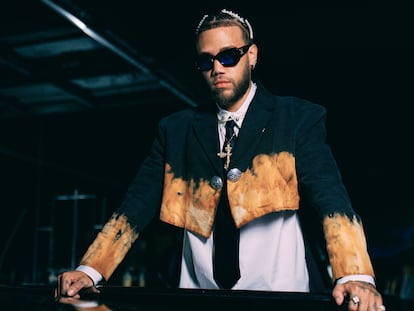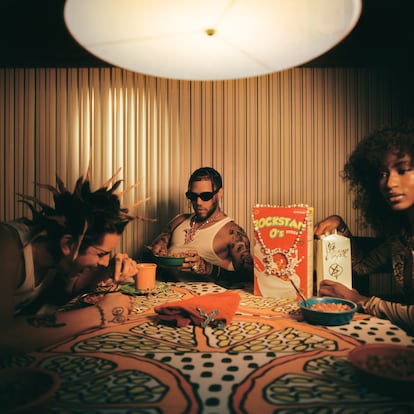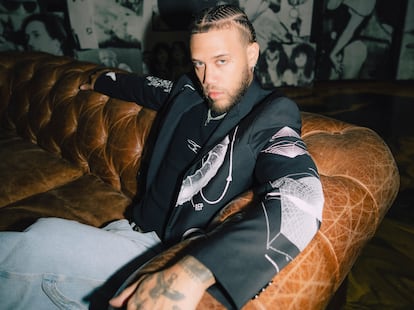JHAYCO: ‘Not everything has to be thuggery, not everything has to be street’
The Puerto Rican reggaeton artist just released ‘Le Clique: Vida Rockstar (X)’, his first album in three years. Its 29-song auditory experience blends genres, signaling a new era in the life and career of the performer formerly known as Jhay Cortez

JHAYCO doesn’t want to be just another reggaeton artist. With his new album, released on Friday, he’s looking to graduate to rock star. The project, a boundary-breaking 29-song double album, incorporates new genres into the 31-year-old Puerto Rican’s repertoire. It’s conceptual, an experience in and of itself. “If you close your eyes on this album, you’ll never know which track you’re on,” says the singer.
Le Clique: Vida Rockstar (X) is coming out three years after the last studio album from the artist formerly known as Jhay Cortez, and includes some of the biggest singles of his career. The release is also a catwalk of collaborations, featuring songs with Quevedo, Eladio Carrión, Peso Pluma, Yandel and DJ Khaled. In conversation with EL PAÍS, JHAYCO, ever-proud of his island, describes the creative process that took him on a journey that started with the sounds he grew with, and resulted in his most ambitious work to date.

Question. You’ve spoken of this album as a new era in your career. In what sense?
Answer. Well, it’s my first production as JHAYCO, not Jhay Cortez, let’s start there. This album helped me to find myself, to find my color, what I bring to the genre, what I bring to the scene, who I am in reggaeton, in Latin music. And I am the rock star. There were rough moments, happy moments, euphoric moments, beautiful moments, sad moments, and through these three years, I’ve been able to develop. This album made me who I am today, which is JHAYCO.
Q. And what does it mean to be a rock star in the world of reggaeton?
A. Everyone has a very mistaken perception of rock stars because of the rock stars who came before. They were always the craziest ones, alcoholics, and I think that nowadays, it’s not like that. Nowadays, Post Malone, The Weeknd, they’re super rock stars, and you see the love and appreciation for their art, the respect they have for their art and their fan base. For me, being a rock star is doing everything you want and a little more. Obviously, not having an everyday life, because my life is not a normal life. That’s why I’m saying, everything that you want to do, everything you dream about, the respect you have for your art, for your passion and a little bit more, that’s a rock star.
Q. How would you define the new album?
A. Pure creativity. From the transitions to the phases of the album, if you close your eyes on this album, you’re never going to know what track you’re on. It’s a body of art. I think a lot has been lost when it comes to albums. I think many albums that come out nowadays are a collection of songs, they’re not an experience. That’s why I took three years. I feel like we’ve lost something by always trying to stay ahead, keep numbers up, put out content, be fast. It’s also important to teach people to take their time to create something that’s well-made. I gave myself three years to insert different genres, different kinds of things like dembow, like the afrobeats that are coming out. You don’t pigeonhole everything into one year and what was a hit that year.
Q. In addition to being a performer, you’re also a composer and producer. How do you approach those roles in different ways?
A. I’m always very diverse in life. I like to do it all, I produce, record, whatever I have to do, I’m going to do it. On Timelezz, I started producing; on Famouz, I focused more on developing my delivery, my voice, the punchlines, the choruses. But on this album, I was able to truly immerse myself in everything creative. Say, “put that song with this,” “no, stop it there,” “no, put this producer on it,” “include this song.” That’s a producer, it’s not just about going in and doing the melodies, but also directing and materializing what you have in mind.
Q. So, you had a hand in everything on this album?
A. Everything. This is all mine, my ideas. Sometimes people don’t understand that. But this is my world, this is my universe.
Q. How do you feel like you have evolved from Eyez on Me to this new album?
A. Too much. I say that the music molded me. The music helped me to find myself, to know who I am, what I like, what I don’t like… You can see it, you can hear the growth. There are a lot of things I didn’t know about art, the love I have for art, for restaurants, for countries, for film, film scores… Music has helped me to discover so many things, so many cultures, subcultures, so many things that I never knew existed. It’s helped me to grow in every way, on a professional and personal level. Truthfully, without music, I wouldn’t be half of what I am.
Q. How do you stay present in a genre that is constantly evolving?
A. You have to be outside. You have to listen, you have to leave your ego behind sometimes. You listen, they’re young people, I remember a lot from when I was young and obviously new things come in, and you mix with people and that affects you. I’m a sponge, I learn. I am a student of this, don’t think that because I got here, I think that I am more than I know. No, there are people who much more talented, there are people who don’t know about music but who are creative, there are people who are 20 years old and have real style. Everything is a lesson, it’s learning, it’s immersing yourself, it’s the humility of you saying, “I want to keep learning,” I want boom, that sound, let yourself go, trust. As hard as you may be, as good of a producer as you may be, listening and letting yourself go and listening to another perspective doesn’t diminish you.

Q. In one of the posts announcing the new album, you wrote: “Thanks to my island for giving me what I always dreamed of.” How has Puerto Rico inspired you, and what relationship do you have to it today?
A. Puerto Rico made me. I am Puerto Rico. Puerto Rico is everything to me. What can I tell you? Coming home from school as a little boy, with my backpack, listening to [singer] Arcángel in the cars going by, and me dreaming that those cars would be listening to me some day. Music culture there is too rich. I come from public housing, which is made up of many buildings where a bunch of people live, obviously they don’t have a lot of resources, but they are very rich, culturally. And that’s what made me, hearing those sounds when I was there. I love Puerto Rico and I will always love it. And I’ll give my life for Puerto Rico. And wherever I go, I am Puerto Rican until I die.
Q. What would you like to see in the future for Puerto Rico?
A. I would like them to get into something else. Not everything has to be maleanteo [thuggery], not everything has to be street. I think we’ve idolized maleanteo and the street too much, and that’s cool, and we all grew up with that, but there are many more things. There’s art. People don’t know that Basquiat was half Puerto Rican and one of the greatest painters in history. There are many other things. Not everyone has to be an artist, either, there are so many things to get into.
I also think that we’re missing a lot of emotional intelligence in Puerto Rico. Therapy. We come from generations of young people who became parents young, you know? There are a lot of things that now, when I leave the island, I understand that we have to improve, and we have to change as a people, because we have good hearts, we fear God, so we have to fix things. Where is the money for these schools? Your kids live there, how can you take that money for yourself when your kids live there and go to school? Education is the future. We’re missing so many things that are being lost, that’s why everything is focused on the street, on maleanteo, because there are no other resources.
A. To conclude, something lighter: where did “me sigue o no me sigue” (“do you follow me or not”) come from?
Q. (Laughs) I don’t know, it just came to me. One day I was recording, and I think I heard Arcángel, in a song when I was young, say “me sigue” and then I don’t know, I put it together and “me sigue o no me sigue todavía.” Like, I can’t tell you that it came from this place, it came out of my madness and it stuck.
Sign up for our weekly newsletter to get more English-language news coverage from EL PAÍS USA Edition
Tu suscripción se está usando en otro dispositivo
¿Quieres añadir otro usuario a tu suscripción?
Si continúas leyendo en este dispositivo, no se podrá leer en el otro.
FlechaTu suscripción se está usando en otro dispositivo y solo puedes acceder a EL PAÍS desde un dispositivo a la vez.
Si quieres compartir tu cuenta, cambia tu suscripción a la modalidad Premium, así podrás añadir otro usuario. Cada uno accederá con su propia cuenta de email, lo que os permitirá personalizar vuestra experiencia en EL PAÍS.
¿Tienes una suscripción de empresa? Accede aquí para contratar más cuentas.
En el caso de no saber quién está usando tu cuenta, te recomendamos cambiar tu contraseña aquí.
Si decides continuar compartiendo tu cuenta, este mensaje se mostrará en tu dispositivo y en el de la otra persona que está usando tu cuenta de forma indefinida, afectando a tu experiencia de lectura. Puedes consultar aquí los términos y condiciones de la suscripción digital.









































